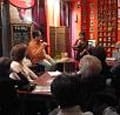Ingrid Thobois went to teach French in Afghanistan. Journey, journey. Following in the wake and spirit of the Swiss writer Nicolas Bouvier or Joseph Kessel, from whom the young Ingrid claims inspiration. Also, a journey of the heart. “I lived very happily,” she sighs, “without being blind to the country’s reality.” Upon her return, she patiently reread the notes she wrote day by day, organized them… to create a manuscript. Naturally, it was “rejected by all the publishers she had contacted.” A usual scenario that did not discourage her at all. She then resumed her work, and a year later, offered her “first novel” to Phébus editions. She knows this does not make her a writer, as the publishers cruelly say. But still…
Fnac, in collaboration with “La Strada” magazine, dedicated a literary café to her, where she, in a way, came to narrate her story. Only somewhat, as the author showed many resistances to evoking the most secret corners of her life. However, the venue chosen by Fnac was as intimate as the content of her book: a café located on Valperga Street (The “Loridan”) run also by a great traveler “Dov”, an “Israeli from Marseille”, who organizes temporary exhibitions, Jazz evenings (every Sunday night), café theater in summer and serves “world cuisine” with a strong Mediterranean influence when he has some time to cook.
Despite this, Ingrid Thobois remained on the defensive. She explains, rather assertively, that the “novel” genre for her book imposed itself over “travel narrative” or “essay,” categories already too populous for this geographical area. We can only take her word for it. But at the first questions about this novel that seems to speak of love, she clarifies that she had to “disguise her emotions.” Even if the title nevertheless mentions “we” and the first person singular narrates this adventure tinged with romance and exoticism, Ingrid Thobois refutes the description of “autobiography” like a cutting blade. And when someone in the audience inquires about “her” love story, she promptly corrects them with “narrator,” as if, by a defense mechanism, she intends to deflect and protect herself from her own painful memories.
Certainly, her goal also aimed to “speak about Afghanistan differently,” an expression however easily interpretable in psychoanalytic terms as “romantic displacement.” Sensing the weakness, the quite large Nice audience, on a beautiful sunny afternoon, presses the advantage: an even more challenging question is asked about this “love, material for literary novel”, almost accusing her of exploiting “feelings for commercial ends.” This leads to a well-maintained intellectual debate on “the porousness between reality and fiction,” on “the sources of inspiration for the novelist,” notably prompting a timely intervention by a young writer specialized in science fiction. Hugo Bellagamba confirms that it is difficult for him to completely abstract from the world around him in his own creation. It’s a blatant truth, humans rarely manage to rid themselves of their history. Even if they wished, it would still impose itself on them.
Eventually, this first literary event by Fnac, to be repeated on the last Saturday of every month, looks promising: the discovery of an author, the narrative of a life, the dynamics of a live exchange… and the unveiling of the harsh vicissitudes of the writer’s profession. We thus eagerly await the next chapter of this saga as literary as it is eventful.


